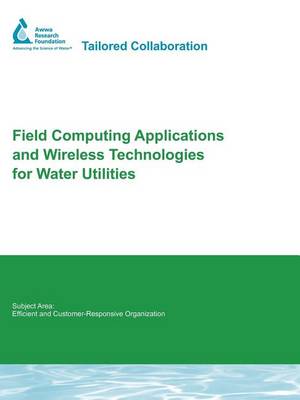Water Research Foundation Report
1 total work
Field Computing Applications and Wireless Technologies for Water Utilities
by C Stern, K. Mallakis, M. Hernandez, B. Iadarola, U. Srinivasan, and S. Sakpal
Published 19 April 2009
Water utility field service employees, in many cases representing more than 50 percent of a utility's workforce, provide mission-critical frontline services such as asset maintenance and repair, emergency response, facility data collection, inspection, line locations, meter reading, record drawings, security, surveys, water quality sampling, and customer field services. Although the costs for field service employees account for a large and significant component of the industry's operating budget, relatively little has been accomplished in evaluating the ability of field computing applications and wireless technologies to measurably improve service and enhance operating efficiency.
The purpose of this project was to assess the current state and use of field computing technologies throughout the water industry, describe key work practices performed by mobile utility workforces and field service professionals, review existing and emerging field computing and wireless technologies, and quantify improvement opportunities and benefits. The research approach included a literature review, an end-user survey, and case studies. Secondary research was conducted on current and emerging mobile technologies and on wireless data management systems/solutions. The researchers developed and implemented a discussion guide for the primary research interviews. Based on these discussions, the team developed and tested a web-based survey questionnaire.
Five case studies, the core of this project, were developed to (1) illustrate existing field computing and wireless implementations, (2) demonstrate associated operational and service improvements, (3) identify areas where benefits could be gained from further use of field computing and wireless technologies, and (4) conduct a Return on Investment (ROI) analysis on the field computing and Mobile Resource Management (MRM) related projects implemented by the utilities participating in the case study.
The purpose of this project was to assess the current state and use of field computing technologies throughout the water industry, describe key work practices performed by mobile utility workforces and field service professionals, review existing and emerging field computing and wireless technologies, and quantify improvement opportunities and benefits. The research approach included a literature review, an end-user survey, and case studies. Secondary research was conducted on current and emerging mobile technologies and on wireless data management systems/solutions. The researchers developed and implemented a discussion guide for the primary research interviews. Based on these discussions, the team developed and tested a web-based survey questionnaire.
Five case studies, the core of this project, were developed to (1) illustrate existing field computing and wireless implementations, (2) demonstrate associated operational and service improvements, (3) identify areas where benefits could be gained from further use of field computing and wireless technologies, and (4) conduct a Return on Investment (ROI) analysis on the field computing and Mobile Resource Management (MRM) related projects implemented by the utilities participating in the case study.
